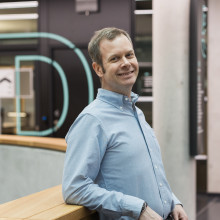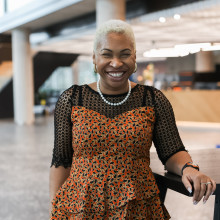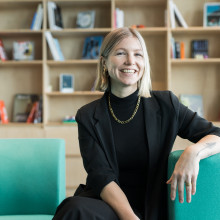How leaders become allies and role models for an inclusive company culture
How leaders become allies and role models for an inclusive company culture
To shape a company culture where inclusion is an ingrained value that everyone lives by, we need to come together, listen to each other, and commit to dismantling inequalities. Learn how Zalando enables leaders to be role models for inclusive behavior at work and beyond.
To shape a company culture where inclusion is an ingrained value that everyone lives by, we need to come together, listen to each other, and commit to dismantling inequalities. Learn how Zalando enables leaders to be role models for inclusive behavior at work and beyond.

At Zalando, we want all our leaders to be role models for inclusion and to champion D&I as a company-wide culture. Through training and personal development sessions, we encourage our leadership teams to challenge their own behaviors in order to become allies for people on their team. In 2023, we made our e-learning programs on unconscious biases mandatory and introduced an allyship training for men. We sat down with Dominik Bertram, Vice President of Fulfillment Core, to discuss the importance and impact of D&I learning sessions.
Hi Dominik, what’s your role at Zalando?
I’m a Vice President on the Fulfillment Core team. I look after a team that builds the software which coordinates the delivery of customer orders and ensures people get their deliveries on time.
How do you define inclusive leadership for yourself?
For me, inclusive leadership means creating an equitable working environment that welcomes and values diversity. To do this, leaders need to work actively at dismantling the dominant culture in their organizations. This can involve visibly supporting and participating in D&I initiatives, speaking up and being an ally, encouraging open dialogue about inclusivity, participating in regular training sessions with teams to raise awareness about unconscious biases and helping employees develop the skills to engage in inclusive behaviors.
And how can leaders be great allies for their underrepresented colleagues?
I believe that, to be great allies, leaders need to be vigilant about their own biases and those within the organization. We need to call out and address discriminatory behaviors or policies, and work toward creating a more equitable environment. For me it’s also important to mentor and sponsor talent from underrepresented groups whenever I can and ensure that everyone's voices are heard and valued in decision-making processes.

For me, inclusive leadership means creating an equitable working environment that welcomes and values diversity. To do this, leaders need to work actively at dismantling the dominant culture in their organizations.
Dominik Bertram, Vice President of Fulfillment Core
Why is it important for Zalando to offer self-reflective learning sessions, such as allyship training?
It’s important because these sessions help us reflect on our privileges, biases and the culture in our organization. This reflection is an essential starting point for enabling leaders to drive improvements in diversity and inclusion, thus creating a working environment that’s welcoming to everyone.
You and your team participated in D&I workshops and the allyship program in 2023. What were your learnings and how did it impact your way of working together?
Last year, we conducted a workshop with women in Fulfillment Core to learn about pain points and devise actions we could take to improve their experience. One of the action points was that men in Fulfillment Core needed to be more empathetic and act like allies. So as a team lead, I decided that men in my team should take part in the allyship training to understand and learn from what women tell us they’re experiencing and to come up with specific actions for ourselves as men to address exclusionary behaviors. We also looked at particular examples of the barriers we face as a team and discussed how we could address them.
What else did your team take away from the course?
We gained a better understanding of how a dominant culture can give people feelings of not belonging or of not being valued. We realized we needed to spend more time learning how we can actively break down barriers to inclusion. Lastly, we discussed how creating an inclusive hiring process requires active efforts, especially in areas of the company where a big majority of the leaders are men.1 As a team, we reflected on our privileged status and biases as men in leadership positions, and we each made commitments toward specific measures we could take to improve diversity and inclusion in our organization.
On an individual level, I aim to ensure the durability of these lessons and embed them into everyday life by widening my inner circle of trusted colleagues to make it more diverse, mentoring diverse talent and creating development opportunities for them, and continuously investing in the further training of leaders within Fulfillment Core.
What are your hopes and dreams for D&I at Zalando and for the world?
My dream for D&I at Zalando is that everyone can work in an environment where they feel safe, valued, understood and supported. The trainings on D&I that I’ve taken part in at Zalando have helped me realize that I have been incredibly privileged to have experienced this most of the time during my career. I hope that I can contribute to everyone having the same experience at Zalando and in Fulfillment Core.
1 Across all five leadership levels, men are represented with a share of 64.4%.
Read other stories




